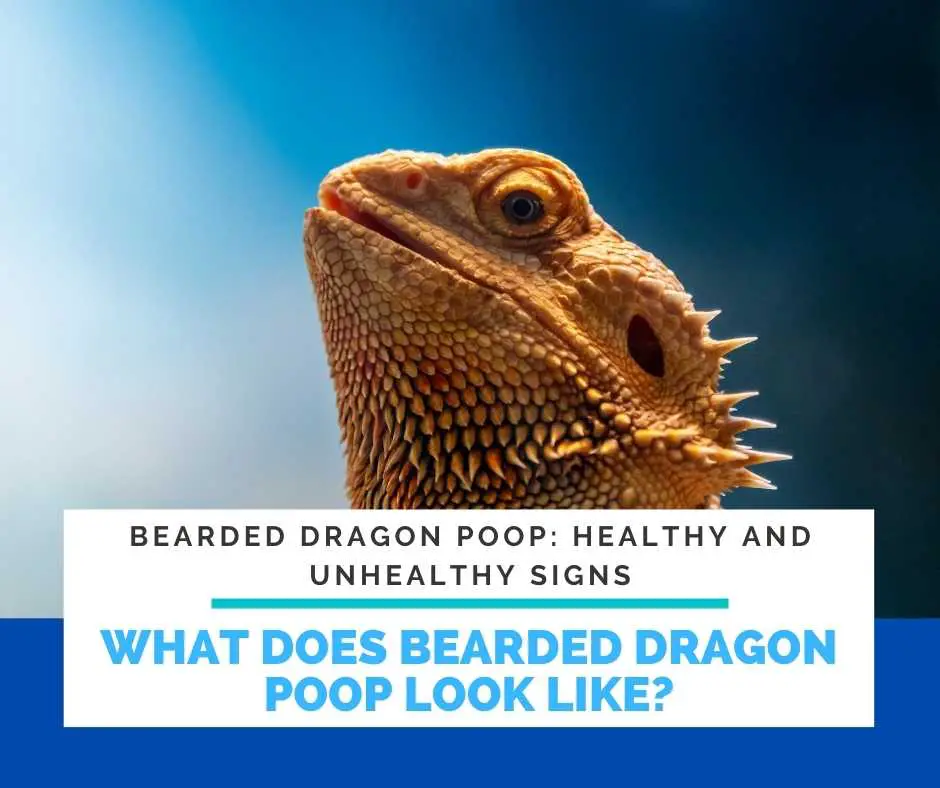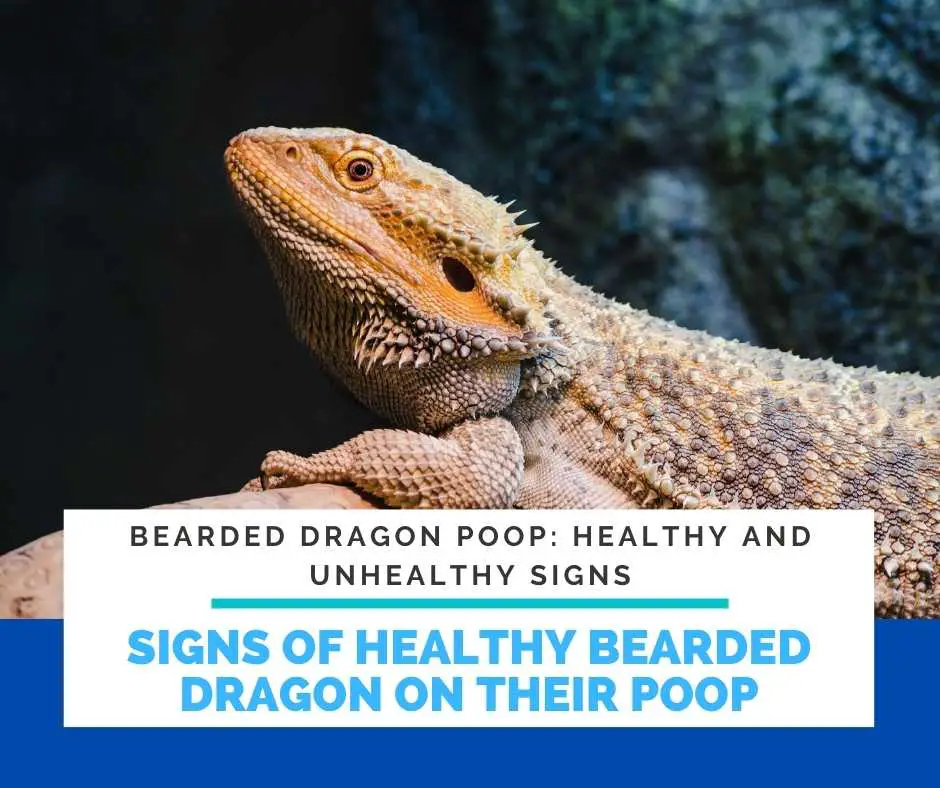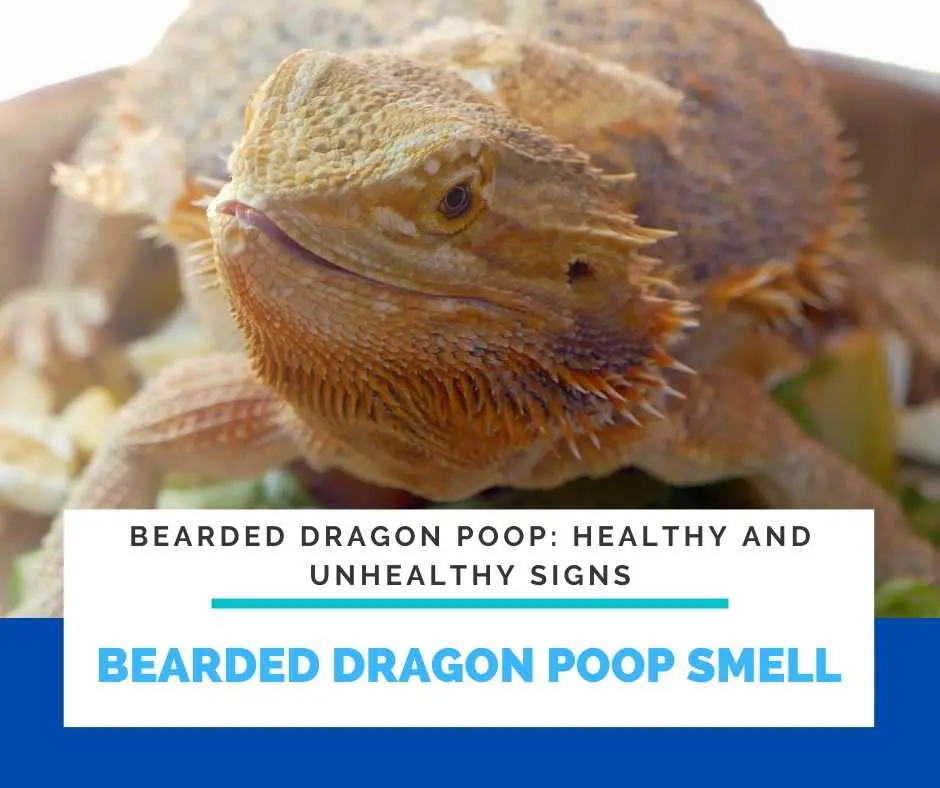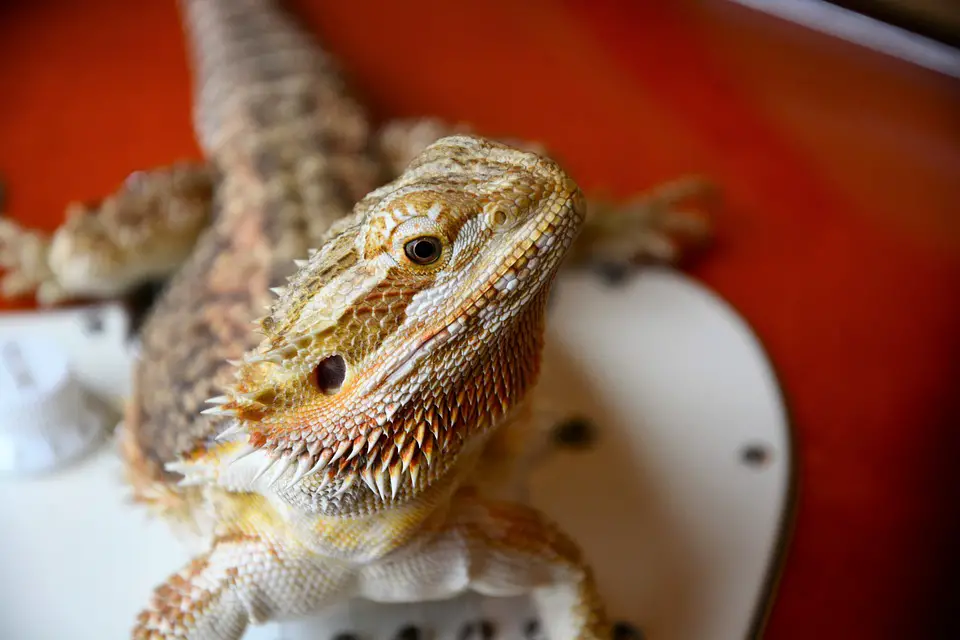Are you wondering what a healthy bearded dragon poop looks like? Here is the right place to get all that you need to know about bearded dragon poop.
A bearded dragon poop explains a lot about its health. Any slight change in your beardie’s poop is worrying, and you will want to know what is happening.
A dragon’s poop tends to change often, but many people don’t know what to do or whether they should worry about it.
In this article, we’ll learn about the signs of a healthy and abnormal bearded dragon poop, and everything you need to know about the beardies pooping behavior.
This article has been reviewed by Dr. Dilber. Read more about our knowledge control process here.
Contents
What Does Bearded Dragon Poop Look Like?

As a bearded dragon owner, you need to know how a healthy dragon poop looks, and why it may appear in a different color or form. You should monitor your beardie’s bowel movement more often whenever it relieves itself.
Sometimes, a dragon can exhibit some strange behaviors, and you may get worried. For instance, if you have a new beardie, don’t be shocked to miss its poop for a couple of days. Also, relocating a dragon to another enclosure can change things.
As soon as the beardie gets used to its new home, and there is correct husbandry, the poop should get back to normal. If things don’t normalize in a week, then there may be a more serious problem.
Regular monitoring is necessary to know when the beardie behaves differently. Here is how a typical bearded dragon bowel movement should look like.

Brown and White Poop
This is the most natural and healthy bowel movement in the bearded dragon. The poop has two parts- a brown and white part. The brown part is the waste from the digested food, and the white section is urate.
Bearded dragons don’t urinate; they produce uric acid, waste from the kidney. They do not have separate organs to excrete digestive and urinary waste. This is one way of conserving water. The urate and solid waste from the digestive system meet in the cloaca, and that’s why they come out together.
Signs of Healthy Bearded Dragon on their Poop

To know about the health status of bearded dragons on their poop, it is necessary to examine poop soon after they defecate.
If a beardie is healthy or unhealthy, you are likely to know through their fecal matter. The poop differs entirely in terms of color, smell, and consistency.
Also, the poop can change its color due to diet. They are good at hiding illnesses until when it is too late. To avoid this, you should have your dragon checked if things seem different.
Color
When checking for color, the typical color for a healthy bearded poop is brown and white. The brownish section is log-shaped, and the white part accompanying it is attached at the rear end. Any color deviating from this might be of concern. Unhealthy poop can all white, red, yellow, or even black and be runny.
Consistency
In terms of consistency, the poop is neither too hard nor too soft. Typically, the brown poop is soft solid and a semi-solid urate.
Sometimes, you may notice a watery pool alongside the poop. This means that the beardie is excreting excess water from the body. Don’t be disturbed if the poop is well-formed. The beardie is okay.
Smell
No poop is pleasant smelling, and people will tolerate smells differently. What may be extremely smelly to you might not be for others.
A healthy poop doesn’t smell awful, and its smell disappears immediately after cleaning. On the other hand, if the beardie is unhealthy, its fecal material has a foul-smell that lingers in the enclosure for a long time, even after cleaning. Pungent and foul smell indicates indigestion.
New to bearded dragon? Check out the bearded dragon care sheet now! We had listed out all the things you need to know about bearded dragons as pets. Check it now!
Bearded Dragon Poop Smell

If there is something wrong with your bearded dragon poop, you should be able to detect it through the odor. Poop with a horrible smell is easy to identify, and will not disappear even after cleaning.
A normal stool odor is not as pungent as the one excreted by an unwell dragon. A stressed beardie can also pass bowel movement that smells bad.
Several potential situations can make the beardies fecal matter smell horrible. One major cause of the awful odor is when the beardie has a parasitic infection. Some parasites like coccidia and pinworms are present in the gastrointestinal tract and can be the reason for the smell.
If a dragon defecates a stinky-smelling poop occasionally, then there is nothing to worry about. Only if it happens consistently should you take it seriously.
Bearded Dragon Diet and Poop Smell
A foul-smelling poop can be due to a bearded dragon’s diet. Some foods like crickets may cause an increased smell in the stool. Also, if the food does not go well with the beardie’s stomach, it is enough to cause a stinky smell in the poop.
If your dragon’s fecal matter has a terrible smell, it is not always due to sickness. The problem might be the food it eats.
You will need to identify the specific food causing the scent, and you may choose to feed the type of food irregularly.
How to Improve the Bearded Dragon Poop Smell
Bearded dragon poop and the smell may just seem weird to talk about, but when it comes to pets, you should consider everything about them. If you are that person who is sensitive to smell, then any beardie’s poop may bother you.
A bearded dragon poop smells a bit, but not awful. Parasitic infection tends to induce a bad smell in bearded dragon poop. When this happens you should have the stool examined by your reptile vet.
Microscopic examination of the stool helps to identify the parasites causing the problem. After that, the beardie will need to be dewormed. It can be done through oral or injectable drugs to control the parasites in the digestive system.
To check whether a specific food is a reason for the stinky smell, try and change the diet for about a week and note what happens. You will be able to know if the problem is from the diet, and it helps you know what to avoid. Note: feed the food that can easily be digested by beardy.
Bearded dragon not Pooping
Baby beardies are in the stage where they are growing fast, and therefore, they need to eat more often than adults. The more they eat, the more they tend to relieve themselves.
Expect your baby dragon to poop anywhere from 2-4 times every day. The adults, on the other hand, may have their bowel movements once or twice a week. It is something normal, so you don’t need to panic.
The only time to start worrying is when the beardie goes for several weeks without pooping. There might be a problem if the beardie is not brumating, and you will need to seek help from a veterinarian.
There are many reasons why a bearded dragon may fail to relieve itself, as we are going to see below.
Why is Bearded Dragon not Pooping?
You may wonder if your dragon has a problem when it stays for more than a week without you noticing any fecal matter. Since there are many reasons behind the beardie not pooping, you need to first identify the root cause of the problem.
Here is the possible cause of a bearded dragon not pooping that every dragon owner needs to know.
Brumation
Brumation is common in the bearded dragon to avoid extreme colds during winter. They may go into hibernation late in the autumn and emerge when the temperatures escalate in spring.
During this period, the beardie is sleeping most of the time, there is decreased appetite, it eats less, and often stops eating. The beardie that is brumating will not poop unless it starts eating again.
Impaction
Impaction is not something new with bearded dragons, and it arises from the beardie eating loose substrate in the enclosure. Loose substrates tend to block the digestive system and affect the pooping behavior in bearded dragons.
I know as a dragon owner, you may be willing to receive advice from a fellow person keeping the dragons, which is still good. But in the process, such people feed each other with ideas that may not always be correct.
For instance, most people who had a bad experience with loose substrates will always discourage you from using the same. This is how the majority of the bearded dragon lovers have refrained from using loose substrates; they view it as a killer.
However, the critical question that you should ask yourself is why a bearded dragon wants to eat substrate. I know sometimes it can happen accidentally when it is devouring the food, but mostly happens as the beardie is searching for minerals. They may delay poop or not poop for several days or weeks due to constipation.
You can use a loose substrate, and your beardie will be okay at any time. Only ensure that it can access calcium if needed, and you will rarely see her eating the substrate. Bearded dragons are prone to dig, and you should not discourage them.
Incorrect Diet
You may be wondering how a diet can make the beardie not poop, but it is possible. Here is why. Bearded dragons are omnivores, and they can eat almost everything, but I don’t mean that you can feed them anything, please get me right.
The primary food for the beardies is greens, vegetables, fruits and insects, calcium, and vitamin supplement, which should be provided occasionally. The amount of food a beardie should eat depends on the age, with the babies eating more often than adults.
New to bearded dragon? Check out the bearded dragon care sheet now! We had listed out all the things you need to know about bearded dragons as pets. Check it now!
An improper diet can also cause constipation. As a result, the bearded dragon does not poop.
If you feed your beardie with excess food, it can block the digestive system and cause the beardie to poop irregularly. Also, feeding insects that are larger than the size of a dragon’s eye might result in blockage.
Always ensure you give the right food to your pet. Feed the adults with more vegetables than feeder insects; they help to clean the digestive system.
Wrong UV Lighting
Providing sufficient lighting is part of the good care that you should give your dragon. Bearded dragons need an external source of heat to regulate their body temperature and for the activation of vitamin D.
There are many reptile light bulbs available in the market, but not all of them are ideal for beardies. People are being misled by the wrong information they get from the internet. It is even worse when you can’t get the right education from the pet stores.
Low temperatures in the enclosure mean that the beardie will not be able to regulate its body temperature in the right way. It will also affect how your beardie digests its food.
With improper digestion of food, there will be no pooping, or the beardie will need more days before removing its bowel movement.
New Environment
Bearded dragons will not only feel uncomfortable in a new environment but may affect their pooping as well. This will only go for several days before the beardie adapts to the environment, and it should defecate after that.
Note: This is rare. It only happens with baby dragons, not adult ones.
Inactivity
If the beardie is lazy, it can have a problem defecating. This might sound funny, but it is true. A bearded dragon should be involved in several activities like climbing on branches in the tank, walking, to promote healthy digestion.
It is always rewarding when you take your beardie for a walk or choose to do other activities like playing together.
Also, a beardie may go without pooping when it is dehydrated or does not get enough food. Make sure your beardie has all it needs to stay healthy. If your beardie is not pooping, it is something you can control.
How Long can a Bearded Dragon Go Without Pooping?
As we have seen, a healthy and adult bearded dragon can poop 1-2 times per week, the babies defecate daily. When a beardie is impacted, it can even go for several weeks without any traces of its fecal matter. Impaction can be dangerous and may even kill your pet.
During brumation, the beardie can go without pooping until the cold season is through, that is, if they don’t eat anything. If your pet wakes up sometimes to feed, then they should also relieve themselves, but it happens infrequently.
For a healthy dragon, it should not exceed two weeks without pooping. If that happens, something may be wrong, and you may need to see a reptile vet.
Why Is My Bearded Dragon’s Poop Runny?
Bearded dragons can excrete a runny poop or have diarrhea due to a variety of reasons. First, it may be due to a change in diet. Also, a beardie may experience diarrhea when it feeds on foods that are rich in fiber such as pumpkin and apples.
Secondly, runny poop could be due to a parasitic infection. The imbalance of microbial flora in the intestine also causes runny poop.
Other signs to help you know if your beardie has a parasitic infection include; anorexia, weight loss, presence of mucus in the poop, and a stinky smell.
If you suspect your beardie to be suffering from a parasitic infection, make sure to see your reptile vet. The problem can be severe if there are no actions taken and at the right time. A bearded dragon can also have a runny poop when it is gravid.
Bearded Dragon Diet and Runny Poop
A bearded dragon diet can also contribute to runny poop. If your beardie takes too much food such as fruits, leafy greens, and hornworms, they can make it to be overhydrated.
Fresh fruits and greens have a lot of water that gets absorbed into the body and make the beardie be overhydrated. Inappropriate absorption of water in the intestine also cause runny poop.
Bearded Dragon Pooping Blood
Any traces of blood in your bearded dragon poop may be a sign of something serious.
Depending on what you recently fed your beardie, the poop can change its color. For instance, you may observe a red poop after feeding raspberries, or beets to your pet. If that is the case, then there is no need to worry.
Another thing that can be the reason for the presence of blood in the poop is a parasitic infection like coccidia. The parasites can damage the walls of the intestines and cause some bleeding. If the beardie is not taking food and appears inactive, it may be due to a parasitic infection. Pooping blood may also be due to Intestinal ulcers.
Whenever you observe such signs, take the sample of the stool to the vet for examination.
Impaction can also be the root cause of your dragon pooping blood. Foreign objects, large feeder insects, and bugs with sharp legs may tear the intestines leading to bleeding.
Why Is My Bearded Dragon’s Poop White?
The white poop is urate, a semi-solid waste product from the kidney. Bearded dragons don’t pee like other animals or humans. Their urine comes in solid form, which is called urate.
If the poop is white and soft, then it is normal. The beardie could be overly-hydrated. However, when the stool is hard or chalky, perhaps, the beardie is dehydrated, and that’s why it can’t defecate properly.
To correct this problem, give your bearded lizard a lukewarm bath, and mist it on the snout. If the beardie excretes urate only, it can also mean that your pet has not had much food.
Wrapping Up
Having read this, I hope you now understand more about bearded dragon poop, and most of your dragon’s poop questions have been answered.
A bearded dragon stool can come in different colors and forms; it is when you understand the reason behind it that you will only be able to act quickly and resolve the issue.

1 thought on “Bearded Dragon Poop: Healthy and unhealthy signs”